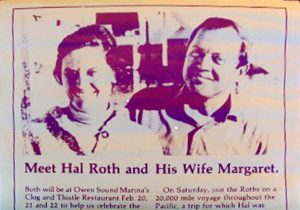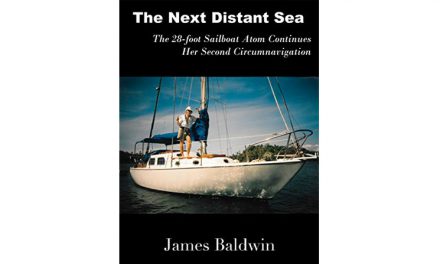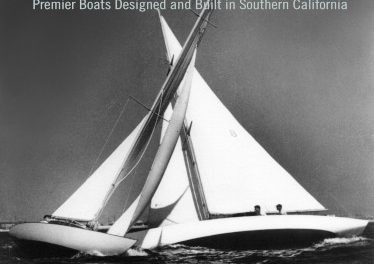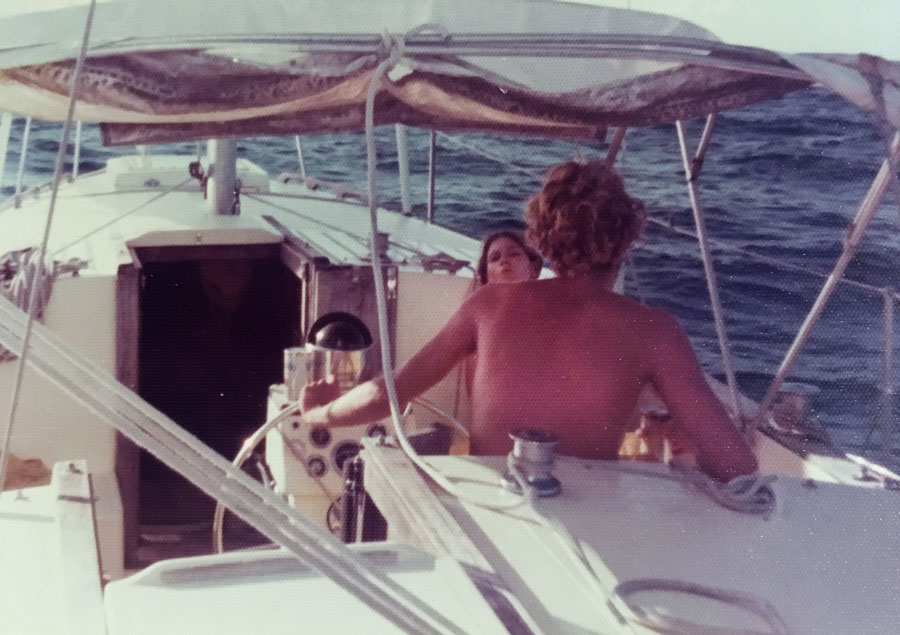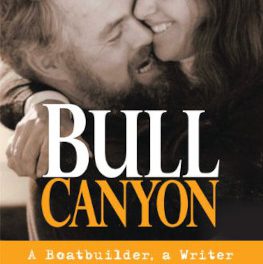Margaret Roth died February 25 in Easton, Maryland. She was the legendary sailing first mate aboard several boats she and her husband, the late Hal Roth, cruised extensively over the years. Hal was a writer who chronicled their adventures in books that still retain a prominent place in any collection of noteworthy sailing literature.
Margaret came to the US from Paris in 1958 and soon met Hal. When they married in 1960, neither knew how to sail, but after sailing with friends on San Francisco Bay, they were hooked. They soon bought their first sailboat, a 36-foot steel sloop.
In 1965, they bought a Spencer 35 and named it Whisper. A year later, they took off to circumnavigate the Pacific. When they returned, the Cruising Club of America awarded them the Blue Water Medal. Hal wrote about their voyage and Margaret typed and edited. Out of this effort was born Two on a Big Ocean, a sailing classic published in 1978.
In 1977, the couple cast off again in Whisper, this time heading south. They were shipwrecked near Cape Horn, rescued after 9 days, and eventually repaired Whisper (she was holed) and continued, up the east coast of the Americas up to Maine. From this adventure, Two Against Cape Horn was published, another bestseller.
A subsequent four-year circumnavigation yielded Always a Distant Anchorage. More books and adventures and awards followed. And through it all, their accomplishments were joint; even when Hal competed in the solo BOC Challenge, Margaret was his indefatigable ground support.
Following is a portion of her obituary as published in The Star Democrat of Easton, Maryland
“Margaret’s wit, grit, determination and tolerance for discomfort and danger were truly legendary and the characteristics of the perfect first mate. In a passage from Two on a Big Ocean, Whisper took a hit from a tremendous wave that crashed over the boat and roared into the cockpit. Hal wrote, ‘Margaret with two safety lines around her, was in the cockpit steering. She suddenly found herself up to her armpits in a bathtub of water only 20 degrees above the freezing point. I saw her sputtering and blowing. She calmly began to take off her clothes and to wring them out. It’s your turn to steer,’ she said gamely. ‘I’ve had my bath for today.’”
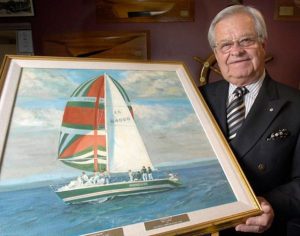 Across the Bar, Don Green (1932-2019)
Across the Bar, Don Green (1932-2019)
Donald M. Green, one of Canada’s most successful offshore sailors and a key figure in its America’s Cup campaigns of the 1980s, has died at the age of 86. He was inducted into the Canadian Sailing Hall of Fame just last August. In 1978, Don won Canada’s Cup with his racing yacht, Evergreen. In 1980, he was made a Member of the Order of Canada, the nation’s most significant civilian honor.
Don grew up sailing and, as a teen, he sailed around the world on Irving Johnson’s 96-foot brigantine Yankee, closing the loop in 1951. In the mid-1970s, Don approached C&C Yachts with the plan to have them design and build a boat he could use to mount a challenge (through the Royal Hamilton Yacht Club) for the 1978 Canada’s Cup. C&C jumped aboard and their young design team led by Rob Ball, and including Steve Killing and Good Old Boat’s own Rob Mazza, designed Evergreen, an IOR Two Tonner of a radical design, with a gybing daggerboard and tiller steering. Don recruited Lowell North to provide sails and to join the crew. The rest of the crew were mainly club sailors from Hamilton, and included a teenager. Don was not just the owner but also the skipper and helmsman, which was very unusual at this level of racing). Evergreen was victorious.
Don next campaigned Evergreen in the notorious 1979 Fastnet Race, in which 15 sailors died. Evergreen did not finish the race, but Don brought her safely back to port with all crew alive and well.
During the 1980s, Don was a part of two Canadian campaigns challenging the America’s Cup, first in 1983, then in 1987
 The Dogwatch/Good Old Boat Excellence!
The Dogwatch/Good Old Boat Excellence!
Boating Writers International (BWI) held its annual awards presentation for writers in mid-February and two Good Old Boat magazine and The Dogwatch writers were recognized! Actually, recognized isn’t really the right term as Craig Moodie won FIRST PLACE in the Boating Lifestyles category for his story, “Floating Time.” That’s a $500 prize for Craig. Read it now, on our website: audioseastories.com/floating-time/
And Good Old Boat Contributing Editor Ed Zacko was awarded two Certificates of Merit, one for “Rata of Seville” (Boating Adventures category) and one for “Battling with Ball Valves” (Boat Projects category). These Certificates mean that Ed’s articles were within very narrow margins of the 3rd-place finishers.
Hat’s off to these award-winning Good Old Boat writers!
Y2K All Over Again
Apparently, GPS units and the satellites they receive from, store date info in a funny way. No, not funny ha-ha.
As reported by Ben Stein on the excellent panbo.com website, “The original specification for GPS had dates stored by week in a 10-bit field (2^10 or 2x2x2x2x2x2x2x2x2x2) which is 1,024 weeks. 1,024 weeks is 19 years, 36 weeks. Dates for the GPS constellation start at midnight on January 5, 1980, so the first rollover occurred on August 21, 1999. Now, 19 years and 36 weeks later, the same thing will happen again on April 6, 2019.”
So what?
So, some older GPS units may not be able to handle the date rollover, which is coming up quickly. Especially if you have older equipment, you’d be wise to check your unit sometime after April 6 to make sure it’s accurate, before you rely on it.
For specific info, check out the website of the manufacturer of your GPS device.
WANT TO EARN A GOOD OLD BOAT HAT?
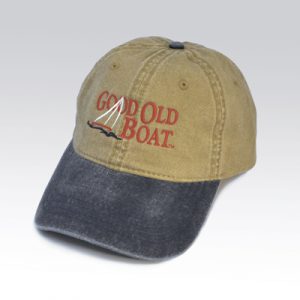 Do you have a great photo of an aid to navigation? We want to see it. If we print it in the magazine, we’ll send you a Good Old Boat hat or shirt, your choice. And it doesn’t have to be a buoy, but certainly can be. The better the photo, or the more unique the aid or photo, the better your chances. Send your photo to Michael_r@goodoldboat.com
Do you have a great photo of an aid to navigation? We want to see it. If we print it in the magazine, we’ll send you a Good Old Boat hat or shirt, your choice. And it doesn’t have to be a buoy, but certainly can be. The better the photo, or the more unique the aid or photo, the better your chances. Send your photo to Michael_r@goodoldboat.com

